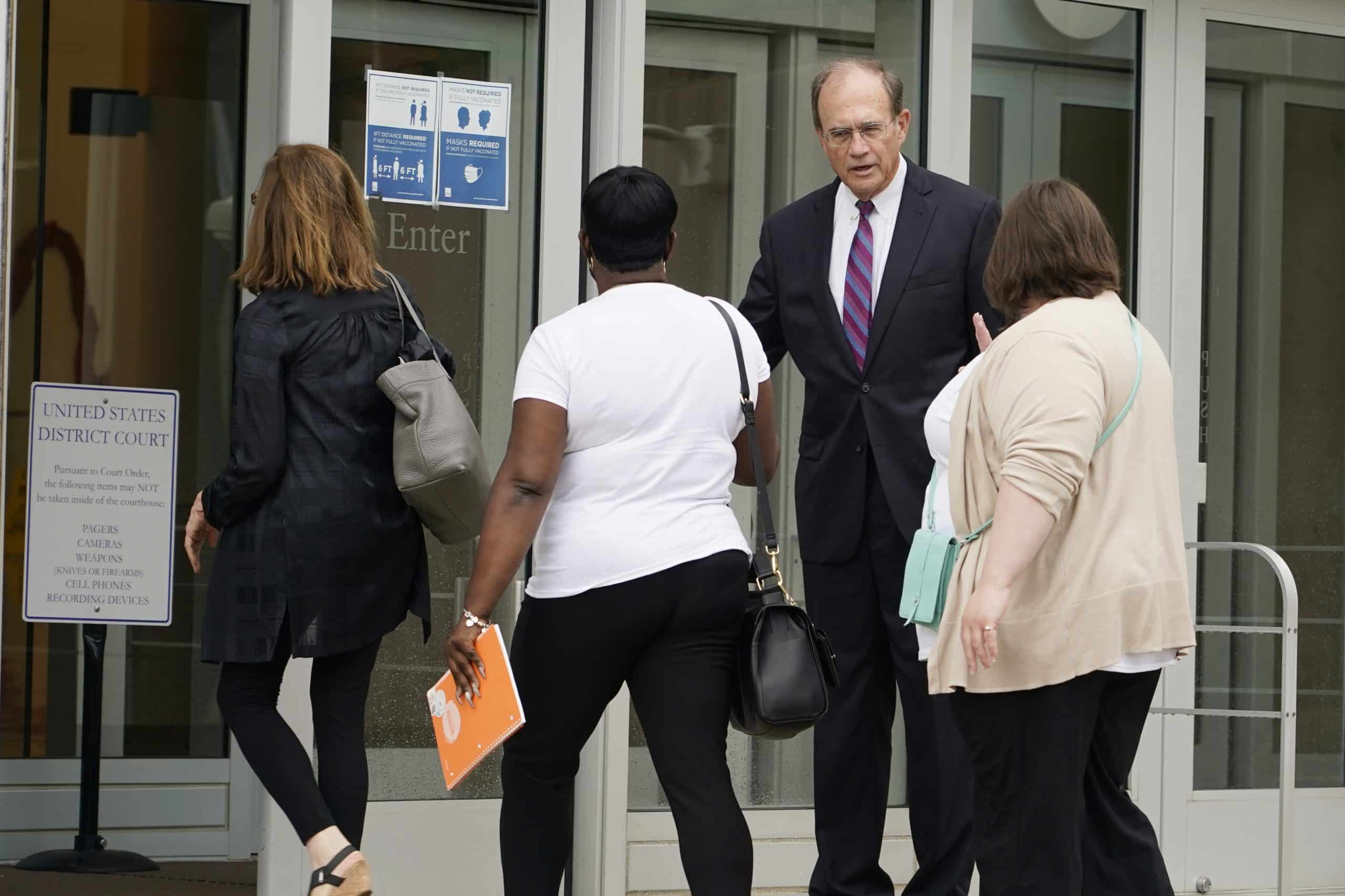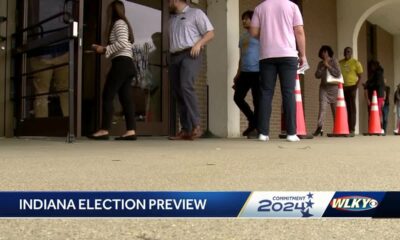Mississippi News
DOJ should not communicate with mental health staff

State moves to block communication between feds and local mental health staff
In November, attorneys from the Department of Justice reached out to staff at Mississippi’s Community Mental Health Centers, which serve as regional hubs for mental health resources and treatment. A federal judge had recently approved a remedial plan calling for the Department to oversee the state’s efforts to expand mental health services at the local level, years after the Department first sued Mississippi over its practice of institutionalizing people with mental illnesses.
In an email to one of the CMHC executive directors, DOJ attorney Patrick Holkins wrote that he and colleagues were “reengaging with key stakeholders in Mississippi” to discuss the plan.
“We are also interested in hearing directly from stakeholders regarding their experiences providing and receiving adult mental health services in the state,” he wrote.
The executive director responded enthusiastically, saying she and her team would be glad to meet with the federal lawyers.
But then the state of Mississippi intervened. Mississippi lawyers claimed a rule of professional conduct for attorneys prevents the DOJ from communicating directly with the CMHCs, according to documents filed by the Justice Department in federal court.
The Justice Department says Mississippi has never before made that claim in more than five years of litigation. It’s asking a federal judge to rule that the state can’t intercede in its communications with community mental health staff, who are neither employed nor represented by the state.
To mental health advocates in Mississippi, the dispute is another example in what they see as a pattern of avoiding scrutiny and transparency. In November, the non-profit oversight group Disability Rights Mississippi sued DMH for refusing to turn over incident reports from state hospitals.
In court, the state argues it has already sufficiently expanded community mental health services. Because the CMHCs are the main providers of local mental health services in Mississippi, talking to them could be a way to find out what’s going on at the local level.
“It really begs the question of what do they not want people to know,” said Joy Hogge, executive director of the nonprofit Families As Allies, which advocates for children with behavioral health challenges and their families.
The state’s 13 Community Mental Health Centers are the primary provider of mental health services at the local level in Mississippi. Funded through Medicaid, state and federal grants and county contributions, they are also receiving an increasing share of DMH’s budget.
They operate mobile response teams and intensive outpatient services, and they’re supposed to help prevent people from ending up in a mental health crisis that requires hospitalization.
How well they are actually doing all of that remains the question at the heart of the federal lawsuit. Mississippi argues services are already in place in its appeal to the U.S. Court of Appeals for the Fifth Circuit.
But advocates and the court’s special monitor, Dr. Michael Hogan, have said it’s too early to make that claim.
Mississippi has not filed its response to the DOJ’s motion. The rule it cited, Rule 4.2, prevents attorneys from communicating directly with someone they know is represented by another attorney in the same matter. It’s intended to protect people who may not understand the risks of talking to a lawyer on the other side of a dispute.
Mississippi’s invocation of Rule 4.2 is based on a 2018 order by Southern District Magistrate Judge F. Keith Ball. Asked to weigh in on when Rule 4.2 prevented federal lawyers from communicating directly with current and former state employees, Ball determined that the rule applied to “any person whose act or omission in connection with the claims and allegations of the Complaint may be imputed to the State of Mississippi for purposes of civil or criminal liability”— in other words, someone who could be considered to be speaking on behalf of the state.
Michelle Williams, chief of staff for the attorney general, said state lawyers concluded that includes CMHC managerial staff.
In his 2019 order finding that Mississippi had violated the Americans with Disabilities Act by institutionalizing people with mental illnesses, U.S. District Court Judge Carlton W. Reeves noted that CMHCs would be key to moving the state away from that practice.
“It is ultimately DMH’s responsibility to manage the expansion of community-based services at CMHCs,” he wrote.
DOJ says Ball’s order addressed only current and former state employees and has no bearing on the CMHCs.
“During more than five years of litigation, the State has never asserted that it represents the CMHCs or that the United States cannot communicate with CMHC staff,” DOJ argues.
The DOJ sued the state of Mississippi, not the CMHCs, for violating individuals’ civil rights through its mental health practices. But now the CMHCs are responsible for implementing much of the remedial plan. The federal lawyers could want to talk with them to make sure they’re aware of what the plan entails and to find out what’s going on day to day, Hogge said.
“The CMHCs know who the people are who are receiving the services, and that voice has never been at the table,” Hogge said.
To add another layer of oversight, the legislature created the position of coordinator of mental health accessibility in 2020. The first coordinator, Bill Rosamond, has so far produced two quarterly reports on the CMHCs.
The most recent report, released in late December, focused on the financially struggling Region 11, which serves nine counties in southwest Mississippi.
Rosamond concluded that “this Region does not have sufficient operational funds to sustain the required mental health services and that the delivery of mental health services is inconsistent in the nine county region.”
In an email to Mississippi Today, DMH communications director Adam Moore said the department doesn’t have information about the Rule 4.2 dispute and referred questions about the ongoing litigation to the attorney general’s office.
He said the department is continuing to expand community-based services. Its proposal for funding from the American Rescue Plan Act would add 60 beds at crisis stabilization units and fund additional mobile crisis response teams that would work with the 988 system, the new three-digit number for the National Suicide Prevention Lifeline, launching this July.
“DMH is also adding an Office of Utilization Review to be responsible for tracking and analysis of the utilization of behavioral health services for state operated programs and key community-based services,” he wrote.
Mississippi may file a response to the Justice Department’s motion before the judge issues an order allowing or prohibiting DOJ from communicating with staff at these mental health centers..
Williams told Mississippi Today the attorney general’s office is evaluating options for its next steps.
This article first appeared on Mississippi Today and is republished here under a Creative Commons license.
Mississippi News
Events happening this weekend in Mississippi: April 18-20

SUMMARY: This weekend (April 18-20), Mississippi offers a variety of events for all ages. In Jackson, enjoy Food Truck Friday, a jazz concert, free outdoor movie screenings, and multiple exhibitions including “Of Salt and Spirit” and “Hurricane Katrina: Mississippi Remembers.” For family fun, there’s an Easter Egg Hunt at the Ag Museum and “Bunnies & Butterflies” at MCM. Natchez features the Spring Pilgrimage, Lafayette’s 200th anniversary celebration, and a farmers market. In the Pine Belt, highlights include Live at Five, a Spring Candle-Making Workshop, and Easter events at the Hattiesburg Zoo. Don’t miss the Bluff City Block Party and more!
The post Events happening this weekend in Mississippi: April 18-20 appeared first on www.wjtv.com
Mississippi News
Events happening this weekend in Mississippi: April 11-13

SUMMARY: This weekend in Mississippi (April 11-13), enjoy a variety of events across the state. Highlights include the Eudora Welty Birthday Bash in Jackson, Trivia Night at the Mississippi Museum of Natural Science, and Boots & Bling Fundraiser in Natchez. For family fun, check out the Bunny Bonanza in Jackson or the Easter Egg Hunt in Clinton. The Natchez Concours d’Elegance Car Show and Stranger Than Fiction Film Festival offer cultural experiences, while the 12th Annual Dragon Boat Regatta in Ridgeland and the Hub City Classic Car Show in Hattiesburg provide exciting activities for all ages.
The post Events happening this weekend in Mississippi: April 11-13 appeared first on www.wjtv.com
Mississippi News
Ole Miss women get pair of double-doubles and roll to 83-65 March Madness win over Ball State

SUMMARY: Mississippi coach Yolett McPhee-McCuin found solace in returning to a different arena in Waco, Texas, following a disappointing previous tournament experience. The No. 5 seed Ole Miss Rebels redeemed themselves with an 83-65 victory over 12th-seeded Ball State in the NCAA Tournament’s first round. Starr Jacobs led the Rebels with 18 points and 11 rebounds, while Kennedy Todd-Williams and Madison Scott each scored 15 points. Ole Miss dominated rebounding, leading 52-32, and will face fourth-seeded Baylor next. Coach McPhee-McCuin noted the team’s evolution since their last visit and the significance of playing in Texas, where Jacobs feels at home.
The post Ole Miss women get pair of double-doubles and roll to 83-65 March Madness win over Ball State appeared first on www.wjtv.com
-

 News from the South - Alabama News Feed7 days ago
News from the South - Alabama News Feed7 days agoFoley man wins Race to the Finish as Kyle Larson gets first win of 2025 Xfinity Series at Bristol
-

 News from the South - Alabama News Feed7 days ago
News from the South - Alabama News Feed7 days agoFederal appeals court upholds ruling against Alabama panhandling laws
-

 News from the South - Missouri News Feed4 days ago
News from the South - Missouri News Feed4 days agoDrivers brace for upcoming I-70 construction, slowdowns
-

 News from the South - North Carolina News Feed6 days ago
News from the South - North Carolina News Feed6 days agoFDA warns about fake Ozempic, how to spot it
-

 News from the South - Virginia News Feed5 days ago
News from the South - Virginia News Feed5 days agoLieutenant governor race heats up with early fundraising surge | Virginia
-

 News from the South - Missouri News Feed6 days ago
News from the South - Missouri News Feed6 days agoAbandoned property causing issues in Pine Lawn, neighbor demands action
-

 Mississippi Today4 days ago
Mississippi Today4 days agoSee how much your Mississippi school district stands to lose in Trump’s federal funding freeze
-

 News from the South - West Virginia News Feed7 days ago
News from the South - West Virginia News Feed7 days agoHeart disease survivor spends 15th birthday raising money for American Heart Association















































